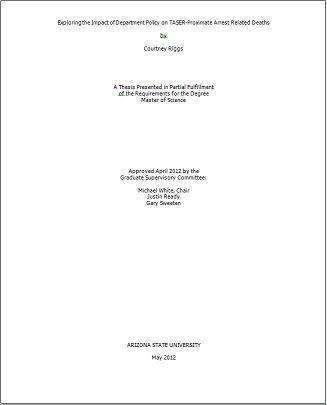Exploring the Impact of Department Policy on TASER-Proximate Arrest Related Deaths
The controversy over law enforcement use of TASER devices and the potential for the devices to cause death has proliferated in recent years. In 2005 the Police Executive Research Forum (PERF) and International Association of Chiefs of Police (IACP) published national-level policy guidelines for the use of TASER devices, with one of the goals being to reduce the occurrence of deaths proximal to their use. What remains unknown in regard to these guidelines is whether or not departments that adhere to these guidelines are experiencing fewer TASER-proximate arrest related deaths (ARDs) than departments who are not. This study seeks to determine preliminary answers to this question by conducting a comparison of the policies of departments with three or more TASER-proximate ARDs to a matched sample of police departments that deploy the TASER, but have no or one to two TASER-proximate ARDs. The departments were matched on the number of full time sworn officers, geography (region, division, or state), and department type. Once matched, all department policies were coded based on how closely they adhered to the following areas of PERF and IACP guidelines: use of force against vulnerable/at risk populations, policies governing the TASER device deployment, training, reporting, and post-exposure requirements.
Study departments when compared to matched departments had a greater number of policies with higher failure to comply rates. The same was true when looking at the category totals, as well as the overall totals, with the difference in failure to comply rates being larger for PERF than IACP. These findings show an association between departments with three or more TASER-proximate ARDs and higher failure to comply rates with national policies. Additionally, it appears that many departments are failing to heed research findings or advice from outside their department. Based on this, future research may want to address the ways in which greater compliance with national policies can be obtained nationwide.
Documents:
|
|
